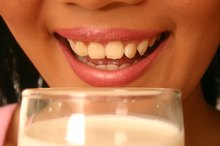What does fact checked mean?
At Healthfully, we strive to deliver objective content that is accurate and up-to-date. Our team periodically reviews articles in order to ensure content quality. The sources cited below consist of evidence from peer-reviewed journals, prominent medical organizations, academic associations, and government data.
The information contained on this site is for informational purposes only, and should not be used as a substitute for the advice of a professional health care provider. Please check with the appropriate physician regarding health questions and concerns. Although we strive to deliver accurate and up-to-date information, no guarantee to that effect is made.
Vitamins for Teen Girls
**Food and beverage companies understand the importance of vitamins so well, they put "fortified with vitamins” right on their labels.
** Truly, vitamins are important for a teen girl’s body, but many packaged foods and beverages are also loaded with extras such as sugar. Understanding how much of each vitamin you need and knowing the best places to find them will help you get the most from your daily diet.
Vitamin A
Vitamin A helps your body form and maintain soft and skeletal tissue, skin and teeth.
You can get a healthy dose of vitamin A each day by eating eggs, meat and dairy products. Some foods are also fortified with vitamin A.
Teen girls need about 700 micrograms of vitamin A every day, according to MedlinePlus, a service of the U.S. National Library of Medicine 45. You can find that in less than 1 cup of spinach.
- Vitamin A helps your body form and maintain soft and skeletal tissue, skin and teeth.
- You can get a healthy dose of vitamin A each day by eating eggs, meat and dairy products.
Vitamins B6 and B12
Nutrition for Teen Girls
Learn More
**Vitamin B6 facilitates brain and nerve communication, helps your body break down proteins and assists in the production of red blood cells, according to TeensHealth from Nemours 23.
Most teen girls need about 1.2 milligrams of vitamin B6 per day, which you can get in about two bananas or a single serving of 100-percent fortified cereal. Other foods rich in B6 include beans, nuts, fish and spinach.
** Vitamin B12 helps your body produce red blood cells and aids in nerve-cell function.
You need about 2.4 micrograms of B12 every day, which you can get in about 3 ounces of sirloin beef. Other sources include fish, eggs, dairy products and fortified cereals.
- Vitamin B6 facilitates brain and nerve communication, helps your body break down proteins and assists in the production of red blood cells, according to TeensHealth from Nemours 2.
Other B Vitamins
Thiamine or vitamin B1, helps your body turn carbohydrates into energy and facilitates heart, nervous system and muscle function. Teen girls need about 1 mcg of thiamine each day. Sunflower seeds are a rich source of thiamine. Riboflavin, or vitamin B2, helps your body build red blood cells and get energy from carbohydrates. You need about 1 mg per day. Almonds are an ideal source.
Niacin, or vitamin B3, aids in nerve function, keeps your skin healthy and helps your body produce energy from food. Teen girls need about 14 milligrams per day, which can be found in peanuts.
Folate, or vitamin B9, helps your body make DNA and red blood cells. You can find it in edamame beans. Potatoes, lentils, beans, whole grains and chili peppers are also healthy sources of B vitamins.
- Thiamine or vitamin B1, helps your body turn carbohydrates into energy and facilitates heart, nervous system and muscle function.
- Teen girls need about 1 mcg of thiamine each day.
Vitamin C
Healthy Living Tips for Teenagers
Learn More
Vitamin C helps your body grow and repair tissues, assists in healing wounds and maintains your teeth, bones and cartilage, according to MedlinePlus 45. Teen girls need about 65 milligrams of vitamin C per day, which you can get in 1.5 cups of tomato juice. All vegetables and fruits contain vitamin C, but some of the sources richest in vitamin C are citrus fruits, strawberries, leafy greens and green peppers.
- Vitamin C helps your body grow and repair tissues, assists in healing wounds and maintains your teeth, bones and cartilage, according to MedlinePlus 4.
- All vegetables and fruits contain vitamin C, but some of the sources richest in vitamin C are citrus fruits, strawberries, leafy greens and green peppers.
Vitamin D
Vitamin D helps your body absorb calcium to build bones. Teens need about 15 micrograms each day, which you can find in about 4 ounces of salmon. Other foods that are rich in vitamin D include egg yolks, fortified foods and fish oils. You can absorb vitamin D just by going outside and taking in some sunshine.
- Vitamin D helps your body absorb calcium to build bones.
- You can absorb vitamin D just by going outside and taking in some sunshine.
Vitamin E
Vitamin E, which protects your cells from damage, is in a variety of foods. Some of the richest sources are vegetable oils, leafy greens, avocados and wheat germ. Most teens need about 15 milligrams of vitamin E every day, which is in about 2 ounces of dry roasted almonds.
Taking a Multivitamin
**The best way to take in your daily vitamins and maintain optimal health is to eat a balanced diet, according to the American Dietetic Association.
** Still, if you’re like many other teens and have trouble eating the five daily fruits and vegetables recommended by the U.S. Department of Agriculture's Food Pyramid, your doctor may recommend that you take a multivitamin.
You may also need a multivitamin if you are a vegetarian or are following any other specialized diet. Talk with your doctor about your nutritional needs.
- The best way to take in your daily vitamins and maintain optimal health is to eat a balanced diet, according to the American Dietetic Association.
- Still, if you’re like many other teens and have trouble eating the five daily fruits and vegetables recommended by the U.S. Department of Agriculture's Food Pyramid, your doctor may recommend that you take a multivitamin.
Related Articles
References
- Dietary Guidelines for Americans: Let the Pyramid Guide Your Food Choices
- TeensHealth from Nemours: Vitamin Chart
- TeensHealth from Nemours: Vitamins and Minerals
- MedlinePlus: Vitamin C
- MedlinePlus: Vitamin A
- Rubin LP, Ross AC, Stephensen CB, Bohn T, Tanumihardjo SA. Metabolic effects of inflammation on vitamin A and carotenoids in humans and animal models. Adv Nutr. 2017;8(2):197-212. doi:10.3945/an.116.014167
- Sproston NR, Ashworth JJ. Role of C-reactive protein at sites of inflammation and infection. Front Immunol. 2018;9:754. doi:10.3389/fimmu.2018.00754
- Bird RP. The emerging role of vitamin B6 in inflammation and carcinogenesis. Adv Food Nutr Res. 2018;83:151-194. doi:10.1016/bs.afnr.2017.11.004
- Chambial S, Dwivedi S, Shukla KK, John PJ, Sharma P. Vitamin C in disease prevention and cure: an overview. Indian J Clin Biochem. 2013;28(4):314-28. doi: 10.1007/s12291-013-0375-3
- Forrest KY, Stuhldreher WL. Prevalence and correlates of vitamin D deficiency in US adults. Nutr Res. 2011;31(1):48-54. doi:10.1016/j.nutres.2010.12.001
- Zhang Y, Leung DY, Richers BN, et al. Vitamin D inhibits monocyte/macrophage proinflammatory cytokine production by targeting MAPK phosphatase-1. J Immunol. 2012;188(5):2127-35. doi:10.4049/jimmunol.1102412
- Saboori S, Shab-bidar S, Speakman JR, Yousefi rad E, Djafarian K. Effect of vitamin E supplementation on serum C-reactive protein level: a meta-analysis of randomized controlled trials. Eur J Clin Nutr. 2015;69(8):867-73. doi:10.1038/ejcn.2014.296
- National Institutes of Health. Vitamin K fact sheet for health professionals. Updated July 2019.
- Aslam MF, Majeed S, Aslam S, Irfan JA. Vitamins: key role players in boosting up immune response-a mini review. Vitam Miner. 2017; 6:153. doi:10.4172/2376-1318.1000153
- Harvard School of Public Health. Three of the B vitamins: folate, vitamin B6, and vitamin B12.
- National Institutes of Health. Folate fact sheet for health professionals. Updated July 2019.
- Palermo A, Tuccinardi D, D'Onofrio L, et al. Vitamin K and osteoporosis: myth or reality? Metabolism. 2017 May; 70:57-71. doi:10.1016/j.metabol.2017.01.032
- Valentini L, Pinto A, Bourdel-Marchasson I, et al. Impact of personalized diet and probiotic supplementation on inflammation, nutritional parameters and intestinal microbiota - The "RISTOMED project": Randomized controlled trial in healthy older people. Clin Nutr. 2015 Aug;34(4):593-602. doi:10.1016/j.clnu.2014.09.023
Resources
Writer Bio
Christa Miller is a writing professional with expertise in massage therapy and health. Miller attended San Francisco State University to earn a Bachelor of Arts in creative writing with a minor in journalism and went on to earn an Arizona massage therapy license.









